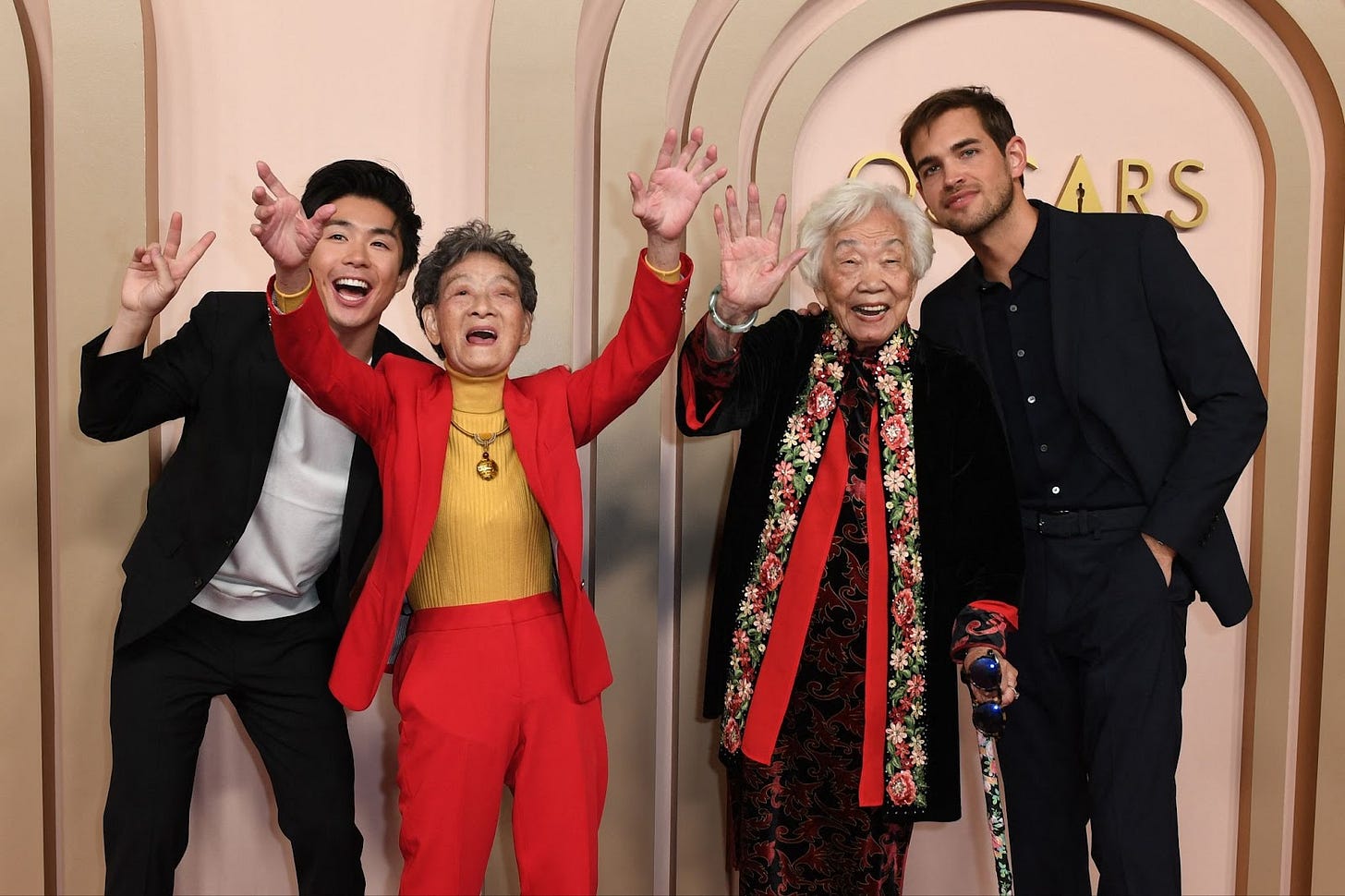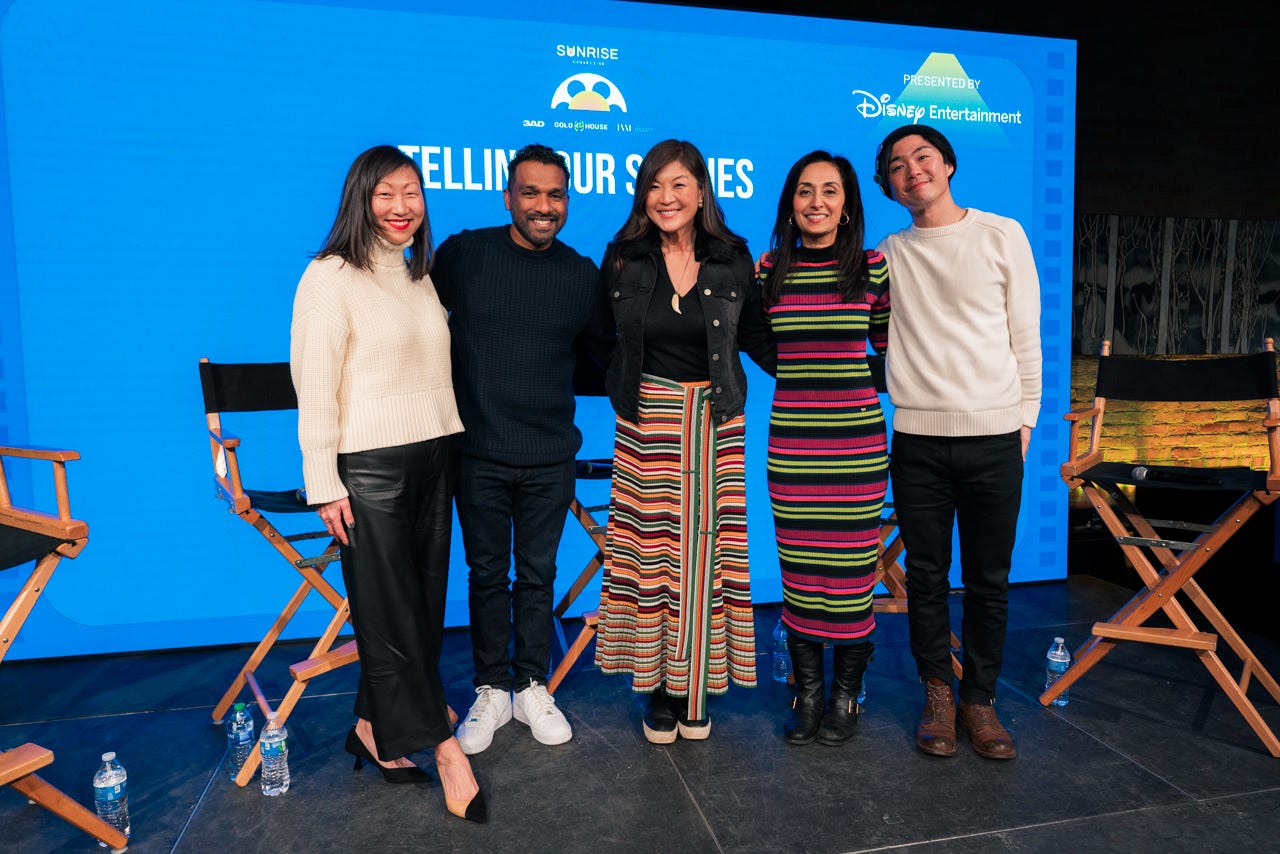Sean Wang Reflects on Academy Award Nominee Nǎi Nai & Wài Pó | Renegades
The filmmaker gears up for the Oscars and his first feature film release
Welcome to Renegades, a series spotlighting Asian Pacific leaders and creatives who are carving their own paths and defying stereotypes along the way. This week, we catch up with writer and director Sean Wang, whose short film Nǎi Nai & Wài Pó has been nominated for an Academy Award, and whose feature film Dìdi premiered at this year’s Sundance Film Festival.
What did you want to be when you were growing up, and how does that compare to what you do today?
I wanted to be the frontman of a punk band and/or pro skater. Both are very different from what I do today and also neither of them happened (sad).
Congratulations on Nǎi Nai & Wài Pó being nominated for an Academy Award! What was it like creating this joyful, heartfelt Documentary Short with your actual grandmothers, and what does it mean to you to receive this recognition alongside them?
It was a very memorable, fun experience that I got to have with my grandmothers. We made this movie as a way to help them, and others like them, feel seen, so to be nominated for an Academy Award and give these two very special women in my life this once-in-a-lifetime experience on one of the world’s biggest stages is very meaningful.
For those who have seen both Nǎi Nai & Wài Pó and Dìdi, there seems to be a strong throughline in style and sensibility between these two projects. How would you describe that style and sensibility in your own words, and how did you approach Documentary versus Narrative when it comes to these equally beautiful portraits of family?
I believe that style should support story, and that can be different depending on the project. To me, I think both films explore deep themes through a lighthearted, joyful lens, so they have that in common. With Nǎi Nai and Wài Pó, we wanted to bring a narrative rigor and craft to documentary storytelling, especially in some of the more playful, skit-like moments, and with Dìdi we wanted to make sure we retained a documentary spontaneity within the structures of narrative filmmaking. Also, Wài Pó is in both movies.
In Dìdi, you’ve beautifully captured the nuances of a teenage Asian American experience in California. How did your personal background and upbringing influence the authenticity of Chris’s character and his coming-of-age journey?
I wasn’t necessarily interested in making a memoir or literal retelling of my childhood. Mining from my personal experience and upbringing was a way to paint a world that felt vivid, lived-in, and authentic, especially since I felt like it was a world that I hadn’t seen before in the coming-of-age stories that I loved.
The film exhibits a perfect blend of humor and heart. Can you share some specific scenes or moments that were particularly challenging to balance between the comedic and emotional aspects, and how you approached those challenges as a Director?
There’s a scene between Chris and Mom where it’s sad and tense, and then she farts and tries to sniff the smell away for Chris and it becomes funny, but there still needed to be a current of sadness that was underneath all of it. That was a hard tone to nail, where it needed to be funny, but still grounded and never too slapstick. We made sure to get a bunch of different versions on set so we could audition what version of the scene worked best in the edit.
What area of filmmaking and storytelling for Asian Americans do you believe needs to be explored more and is underrepresented?
I think there’s so many different facets to our collective experience and we’ve only scratched the surface of what kinds of stories have been told.
Are there any mentors or people in your life that inspired you to take on visual art form and more specifically films?
Spike Jonze, Carlos López Estrada, my mom.
What was it like to have your family, cast, and friends with you at Sundance? Any fun stories to share?
The best week of my life. My grandma met and took a photo with Jason Schwartzman.
Your parents are from Taiwan and came to America when they were 26. How has their journey and experiences they’ve shared influenced your creative expression and beliefs?
It’s influenced everything. It’s the defining experience of how I see the world and trickles down into everything I make.
What’s an exciting next step for you as you embark further in your path as a film director and writer?
Releasing Dìdi! In theaters July 26, 2024.
Lightning Round
Daily habit: Flossing
Favorite scene in Nǎi Nai & Wài Pó: Last scene (no spoilers)
Nostalgic toy you played with as a kid: Tech Decks
Funny cast moment: Teaching the kids how to use a flip phone and t-9 text.
Three words to describe Nǎi Nai & Wài Pó: Beautiful, Childlike, Gassy.
Go to comfort meal: Stir fried tomato & egg over rice
Fun fact: real eyes realize real lies






